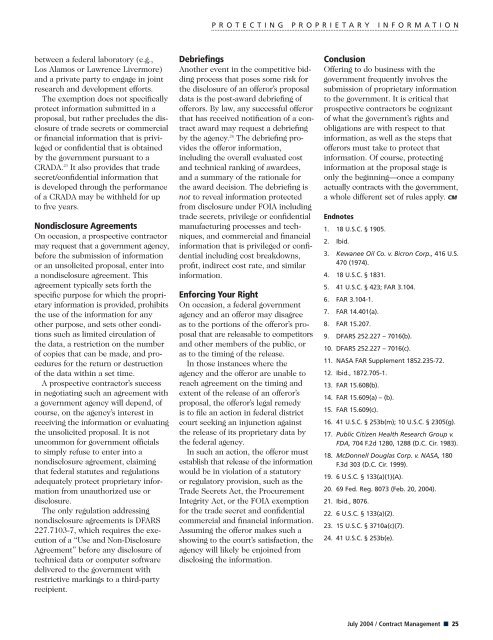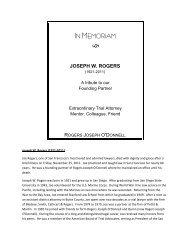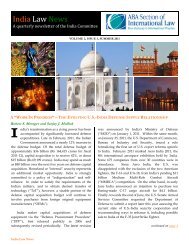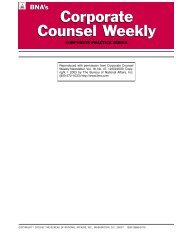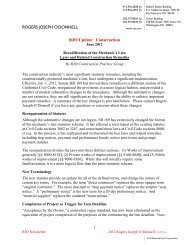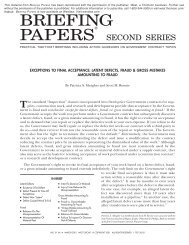Proprietary Information Proposal Proprietary Information Proposal
Proprietary Information Proposal Proprietary Information Proposal
Proprietary Information Proposal Proprietary Information Proposal
- No tags were found...
You also want an ePaper? Increase the reach of your titles
YUMPU automatically turns print PDFs into web optimized ePapers that Google loves.
PROTECTING PROPRIETARY INFORMATIONbetween a federal laboratory (e.g.,Los Alamos or Lawrence Livermore)and a private party to engage in jointresearch and development efforts.The exemption does not specificallyprotect information submitted in aproposal, but rather precludes the disclosureof trade secrets or commercialor financial information that is privilegedor confidential that is obtainedby the government pursuant to aCRADA. 23 It also provides that tradesecret/confidential information thatis developed through the performanceof a CRADA may be withheld for upto five years.Nondisclosure AgreementsOn occasion, a prospective contractormay request that a government agency,before the submission of informationor an unsolicited proposal, enter intoa nondisclosure agreement. Thisagreement typically sets forth thespecific purpose for which the proprietaryinformation is provided, prohibitsthe use of the information for anyother purpose, and sets other conditionssuch as limited circulation ofthe data, a restriction on the numberof copies that can be made, and proceduresfor the return or destructionof the data within a set time.A prospective contractor’s successin negotiating such an agreement witha government agency will depend, ofcourse, on the agency’s interest inreceiving the information or evaluatingthe unsolicited proposal. It is notuncommon for government officialsto simply refuse to enter into anondisclosure agreement, claimingthat federal statutes and regulationsadequately protect proprietary informationfrom unauthorized use ordisclosure.The only regulation addressingnondisclosure agreements is DFARS227.7103-7, which requires the executionof a “Use and Non-DisclosureAgreement” before any disclosure oftechnical data or computer softwaredelivered to the government withrestrictive markings to a third-partyrecipient.DebriefingsAnother event in the competitive biddingprocess that poses some risk forthe disclosure of an offeror’s proposaldata is the post-award debriefing ofofferors. By law, any successful offerorthat has received notification of a contractaward may request a debriefingby the agency. 24 The debriefing providesthe offeror information,including the overall evaluated costand technical ranking of awardees,and a summary of the rationale forthe award decision. The debriefing isnot to reveal information protectedfrom disclosure under FOIA includingtrade secrets, privilege or confidentialmanufacturing processes and techniques,and commercial and financialinformation that is privileged or confidentialincluding cost breakdowns,profit, indirect cost rate, and similarinformation.Enforcing Your RightOn occasion, a federal governmentagency and an offeror may disagreeas to the portions of the offeror’s proposalthat are releasable to competitorsand other members of the public, oras to the timing of the release.In those instances where theagency and the offeror are unable toreach agreement on the timing andextent of the release of an offeror’sproposal, the offeror’s legal remedyis to file an action in federal districtcourt seeking an injunction againstthe release of its proprietary data bythe federal agency.In such an action, the offeror mustestablish that release of the informationwould be in violation of a statutoryor regulatory provision, such as theTrade Secrets Act, the ProcurementIntegrity Act, or the FOIA exemptionfor the trade secret and confidentialcommercial and financial information.Assuming the offeror makes such ashowing to the court’s satisfaction, theagency will likely be enjoined fromdisclosing the information.ConclusionOffering to do business with thegovernment frequently involves thesubmission of proprietary informationto the government. It is critical thatprospective contractors be cognizantof what the government’s rights andobligations are with respect to thatinformation, as well as the steps thatofferors must take to protect thatinformation. Of course, protectinginformation at the proposal stage isonly the beginning—once a companyactually contracts with the government,a whole different set of rules apply. CMEndnotes1. 18 U.S.C. § 1905.2. Ibid.3. Kewanee Oil Co. v. Bicron Corp., 416 U.S.470 (1974).4. 18 U.S.C. § 1831.5. 41 U.S.C. § 423; FAR 3.104.6. FAR 3.104-1.7. FAR 14.401(a).8. FAR 15.207.9. DFARS 252.227 – 7016(b).10. DFARS 252.227 – 7016(c).11. NASA FAR Supplement 1852.235-72.12. Ibid., 1872.705-1.13. FAR 15.608(b).14. FAR 15.609(a) – (b).15. FAR 15.609(c).16. 41 U.S.C. § 253b(m); 10 U.S.C. § 2305(g).17. Public Citizen Health Research Group v.FDA, 704 F.2d 1280, 1288 (D.C. Cir. 1983).18. McDonnell Douglas Corp. v. NASA, 180F.3d 303 (D.C. Cir. 1999).19. 6 U.S.C. § 133(a)(1)(A).20. 69 Fed. Reg. 8073 (Feb. 20, 2004).21. Ibid., 8076.22. 6 U.S.C. § 133(a)(2).23. 15 U.S.C. § 3710a(c)(7).24. 41 U.S.C. § 253b(e).July 2004 / Contract Management ■ 25


